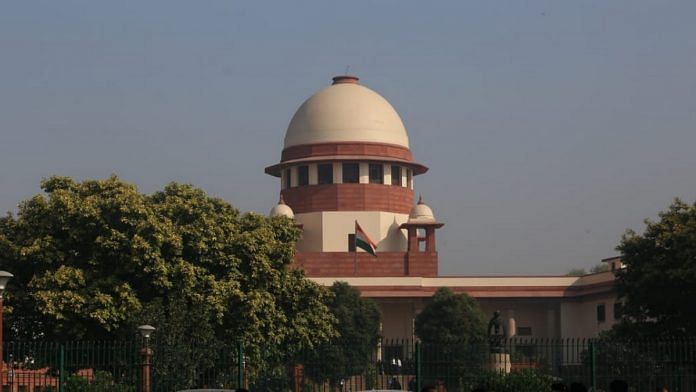New Delhi: The Supreme Court Monday upheld the constitutional validity of the Scheduled Castes & Scheduled Tribes (Prevention of Atrocities) Amendment Act, 2018, which the Narendra Modi government had brought in to nullify an SC order diluting stringent provisions of the law.
The 2018 Supreme Court verdict had made a provision for anticipatory bail to offenders under the law. However, after strong protests against the dilution across the country, the Modi government removed this provision to bring the law back to its original form.
On Monday, a three-judge bench led by Justice Arun Mishra upheld the amendments, ruling that though the provision of anticipatory bail is not available under the law, courts can quash FIRs in exceptional circumstances.
The court also ruled that preliminary enquiry is not a must in cases of atrocities against SCs/STs, and no prior approval of an appointing authority or senior police officers is required before filing FIRs.
Justice S. Ravindra Bhat, who was part of the bench also comprising Justice Vineet Saran, wrote a separate order concurring with Mishra. However, he added a caveat that anticipatory bail should be granted only in extraordinary situations where a denial of bail would mean miscarriage of justice.
This is the top court’s second crucial verdict in connection with the SC-STs in less than a week. On 7 February, the court ruled that reservation in promotions in government jobs is not a fundamental right, and it is within the absolute discretion of a state government to decide whether or not to provide for reservation in promotions.
Also read: Dread, betrayal, poverty, hope: Stories of forgotten families of 16 Dec gang rape convicts
The case SC&ST (Prevention of Atrocities) Amendment Act
The Supreme Court’s latest order has come over a batch of petitions challenging the SC/ST (Prevention of Atrocities) Amendment Act. The court had reserved its order in the case in October last year.
At the time, the court had recalled its 20 March 2018 judgment in a review petition filed by the government. The 2018 judgment had diluted the original 1989 legislation, saying the SCs/STs were using the provisions to file false criminal complaints against innocent persons.
The government brought in the amendments to nullify this judgment, saying the SC-STs continue to face the same social stigma, poverty and humiliation to which they have been subjected for centuries.
Reserving its order last year, the court had said it was wrong on the part of the earlier judgment to treat all SC/ST community members as “a liar or crook”. It was against “basic human dignity”.
It had clarified at the time that the court would not dilute the provisions of the statute. “We will not be touching anything,” Mishra had said.
Also read: Why I converted to Islam and buried my Hindu identity: Dalit Camera founder




In SCs/STs matter, thousands & thousands of years of discremenation cannot be wiped out, in one generation.Whosoever, kindly hold on before giving negative verdict.
totally wrong story, the print was published totally wrong content, why govt removes, amendment verdict given by suprime court of india. the print don’t have minum common sence.
The real irony is that a Supreme Court Judge can say that a patently casteist law which discriminates against other persecuted communities such as Brahmanas is the only way to get rid of casteism without being considered sarcastic(!)